Are you traveling to Japan and have no idea what Japanese medicine to take for headaches, flu, poor digestion, hangovers, aches and other problems? In this article we will see a guide to Japanese remedies for various problems and situations.
It is worth remembering that many medicines in Japan usually come in packs with many small pills. It is usually necessary to take 2 or more pills to equal one pill in Brazil. It's best to follow the instructions!
Table of Content
Kusuri and Yakkyoku - Drugstore in Japan
Kusuri [薬] means medicines, pharmaceuticals, medicines and medicinal drugs. You already know what to ask if you are in a pharmacy.
Pharmacy in Japanese is called Yakkyoku [薬局] and they usually offer more than just medicine. Some Japanese pharmacies are big markets with different types of products.
Throughout this article, you will learn the names of some medicines to take care of your health. If you are feeling very unwell, we recommend seeking a: 日本の病院.
Curious about what drugstores are like in Japan? See a video below:
Classification of medicines in Japan
On the packaging of Japanese medicines, you will find the following characters [第○類医薬品] where in place of the circle will be a number from 1 to 3. This number is the classification of the medicine where each number means:
Class 1 drugs: They cannot be purchased directly, but are delivered by pharmacists. The medicine is usually strong and has several side effects.
Class 2 drugs: Sold by registered pharmacists or retailers. While class 2 drugs are not as intense as class 1 drugs, keep an eye out for side effects.
Class 3 drugs: These are regular medications available at any pharmacy. Registered pharmacists and resellers will be able to answer any questions about this over-the-counter drug.
In some medications, you will find the ideograms [第[2]類医薬品] - These class 2 medications should not be taken with other medications and are not suitable for pregnant women and children.
Japanese Remedies for Headaches and Others
Many people experience headaches due to changes in weather or mental fatigue. The Bufferin [バファリン] is a medicine mainly used for headache symptoms and costs on average 1,000 ienes.
It also has other different versions, each targeting a certain type of pain symptom:
- Bufferin A - Standard;
- Buffering Premium - Extreme pain;
- Bufferin Luna - Cramps and other pains;
- Bufferin Kaze EX - Related to colds;
Tylenol [タイレノール] is another remedy used for headaches, it is the equivalent of paracetamol. It is usually indicated against fever, flu, toothache, headache, menstrual cramps, arthritis and back pain.
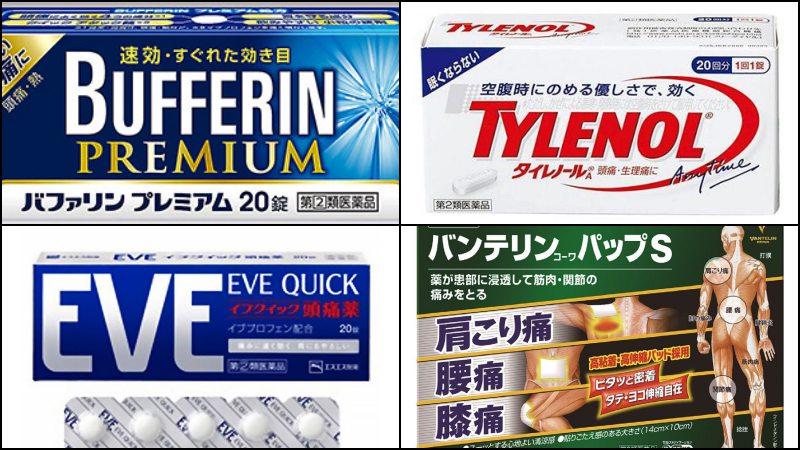
Another common headache remedy is EVE QUICK, which is made of ibuprofen. Both tylenol and EVE, as well as other headache medications, can cost around 1,000 yen.
When we take a trip to Japan, we may also end up suffering from muscle pain. But in Japan, this is not a problem when you have Vantelin [バンテリン] that can be found easily.
Japanese cold and flu remedies
In addition to the mentioned bufferin and tylenol that can combat certain types of flu symptoms, there are Japanese medicines specifically for solving flus and colds.
Pabron [パブロン] is a remedy that relieves your cold, eases symptoms such as coughing, sore throat and runny nose. This remedy can be found in pill and powder forms for around 1300 yen.
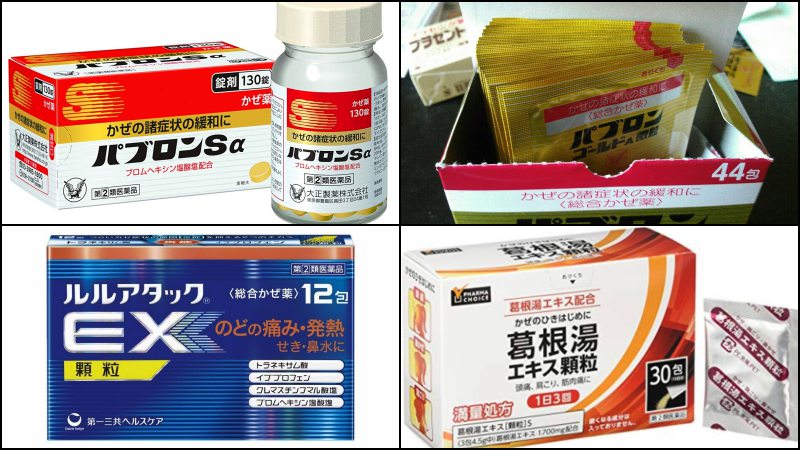
We also have Lulu Attack EX [ルルアタック EX] that relieves chills, nasal congestion, phlegm, fevers, and sneezing. The medicine Kakkonto [葛根湯] has the same effect, but it is more commonly used at the beginning of colds.
If you want a remedy that directly combats a symptom, you can search the pharmacy for the words below:
- 風邪 (kaze) - common cold;
- 喉 (node) - throat;
- 咳 (seki) - cough;
- 咳き込む (sekikomu) - violent cough;
- 痰 (tan) - phlegm;
- 鼻づまり ha (hanazumari) - stuffy nose;
- くしゃみ (kushami) - sneezing;
- さむけ (samuke) - tremendous;
- 発熱 (netsu) - fever;
- アレルギ (arerugī) - allergy;
Japanese remedies for sore throat
For sore throat and inflamed throat, we have Loxonin S which is also effective against joint pain, sprains, headaches, bruises, pain from broken bones, shoulder pain, neuralgia, muscle pain, and cramps.
But if you have a weak stomach, it's better to look for other remedies because Loxonin S affects the stomach and is more expensive than other painkillers. You can simply buy cheap remedies like throat lozenges.
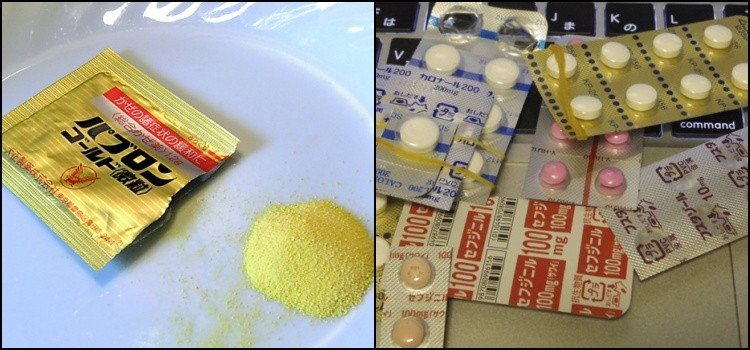
Go to a pharmacy and look for nodo [のど/喉] which means throat. You might even find throat lozenges in supermarkets and convenience stores.
Japanese Medicines for Nausea and Digestion
The Travelmin [トラベルミ] is the medication indicated to help you with issues of nausea, diarrhea, stomach pain, nausea, and vomiting. The Travelmin Junior [トラベルミンジュニア] is indicated for children over 5 years old.
However, another remedy that can be used for the same problem is Seirogan [正露丸], it practically has the same effect and relieves your stomach pain and indigestion.
The Seirogan has a very strong smell and taste, which is not very pleasant, meaning not everyone can take this type of medication.
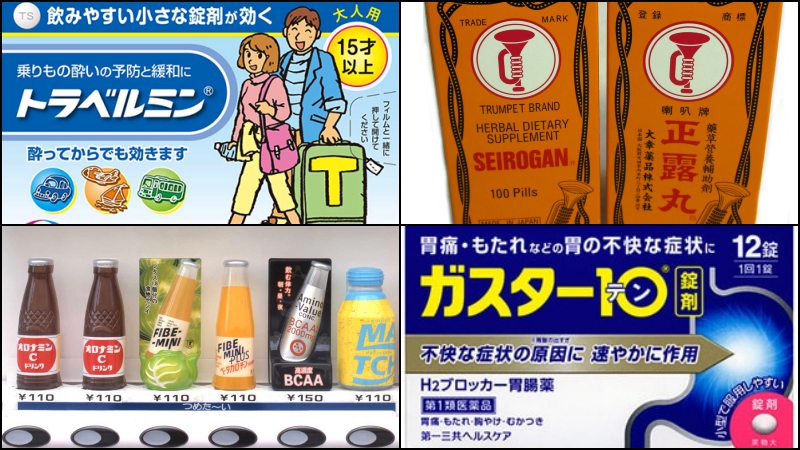
Fibe Mini is a drink that promises to relieve constipation. Anyone who has intestinal problems and becomes constipated easily, whether from stress or food, Fibe Mini can alleviate quickly in emergencies.
Another medicine that can help with the same problem is Gaster 10, which mainly relieves heartburn and improves stomach function; this medication is available in liquid, powder, and tablet forms.
Japanese medicines for insect bites
The Kinkan [キンカン] is used for bites of all kinds of insects, body pain in the hips, shoulders, sprains, and bruises. This medicine is a liquid that is applied to the area where the insect has bitten.
But there is not only the Kinkan [キンカン], you can also find the Muhi [ムヒ]. This medicine can be used for frostbite, dermatitis, rashes, inflammations, eczema, and hives.
This medication comes with tubos or roll-on, which are applied to the desired areas where you were bitten by insects. You can also choose repellents and other creams that we mentioned in the article about insects in Japan.
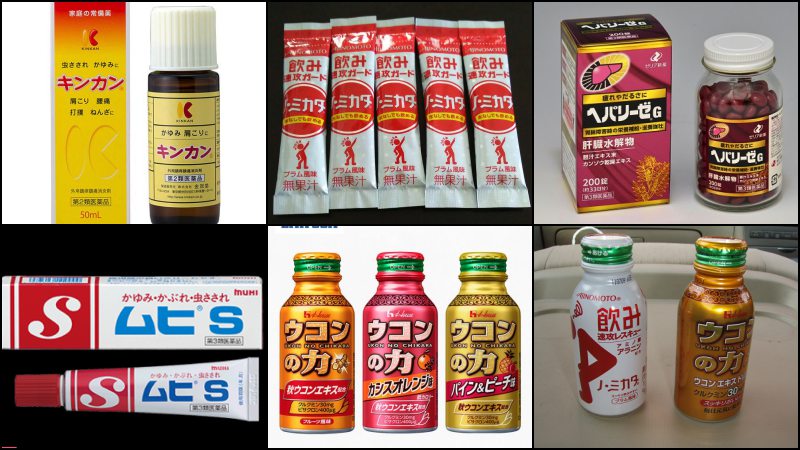
Japanese hangover medicines
The heparize [ヘパリーゼ] will help you get through a hangover, this miraculous medication will give you strength the next day after a night out at an izakaya or at a party.
No Mikata [ノ·ミカタ] is a medication that when taken can prevent hangover symptoms, you can take it before drinking alcoholic beverages or during, even after drinking. We also recommend Ukon No Chikara [ウコンの力].
These medicines can also be found in convenience stores in a beverage version in a small glass bottle. Some can be dissolved in water. If you are looking for another medicine, search for the word futsukayoi [二日酔い].
female japanese medicines
Ninokyua used for dry skin, red bumps, itchiness, irritated skin and other symptoms of those with sensitive skin. These symptoms can be found in the arms and legs and cause an uncomfortable feeling.
The Chocola BB assists with hormonal issues that can be common, especially in women. The Chocola BB are tablets that contain vitamins and combat acne and even canker sores, addressing problems from the inside out.
Bo-koren helps relieve the typical pain of a urinary tract infection, decreases that feeling of going to the bathroom and helps to eliminate the bacteria that causes the infection.
meditator is quite popular in Japan for vaginal infections [kanjida chitsuen]. many women use before go to the doctor for symptom relief. found in ointment, spray or tablet formulations.
Vocabulary to find your medicine in Japan
To finish the article, I will leave a list of words that are symptoms and you can look up the medicines or ask a pharmacist or registered seller.
I hope you enjoyed the article, if you liked it, share it and leave your comments.
| Portuguese | Japanese | Romaji |
| common cold | かぜ/風邪 | kaze |
| acne | ニキビ | nikibi |
| pressure point sticker | つぼ用シール | tsuboyō shīru |
| allergy | アレルギー | arerugī |
| antihistamine | 抗ヒスタミン剤 | kōhisutaminzai |
| burning, burning | ヒリヒリ | hiri-hiri |
| Job's tears draw | はとむぎエキス | hatomugi ekisu |
| asthma | ぜんそく/喘息 | zensoku |
| heartburn, sour stomach | 胸やけ/胸焼け | munayake, muneyake |
| saffron | ウコン | ukon |
| nutritional drink (energy/vitamins) | 栄養ドリンク | eiyō dorinku |
| bubble, pimple | おでき | odeki |
| corn | たこ | tako |
| face | かお | kao |
| carnitine | カルニチン | karunichin |
| poultice | パップ剤 | pappuzai |
| phlegm | たん/痰 | tan |
| scar | 傷あと | kizuato |
| scar, mark | あと | ato |
| itchy eyes | 目のかゆみ | me no kayumi |
| cholesterol | コレステロール | koresuterōru |
| collagen | コラーゲン | korāgen |
| eye drops | 目薬 | megusuri |
| eat a lot | 食べ過ぎ/食べすぎ/たべすぎ | tabesugi |
| itch | かゆみ | kayumi |
| pill | 錠劑 | jōzai |
| compress | シップ剤 | shippuzai |
| freezing | しもやけ/霜焼け | shimoyake |
| excessive consumption | 飲み過ぎ/飲みすぎ/のみすぎ | nomisugi |
| elbow | ひじ | hiji |
| cream | クリーム | kurīmu |
| calcium | カルシウム | karushiumu |
| capsule | カプセル | kapuseru |
| daiper | おむつ | omutsu |
| blue light damage | ブルーライトダメージ | burū raito damēji |
| peeling skin due to dryness | 皮むけ | kawamuke |
| discoloration | シミ | shimi |
| diarrhea | 下痢/げり | geri |
| diet | ダイエット | daietto |
| stomach pain discomfort | 胃の不快感 | i no fukaikan |
| stomach ache, nausea | むかつき | mukatsuki |
| eczema | しっしん | shisshin |
| bruise | 打ち身 | uchimi |
| bagged | パック | pakku |
| mouthwash | うがい薬 | ugai-gusuri |
| rash | かぶれ | kabure |
| rash, acne | 吹き出物 | fukidemono |
| heat rash | あせも | asemo |
| scald, burn | やけど | yakedo |
| sneezing | くしゃみ | kushami |
| steroids | ステロイド | suteroido |
| stomach | おなか | onaka |
| heavy stomach, troublesome digestion | 胃もたれ | imotare |
| eyestrain | 目の疲れ | me no tsukare |
| fever | 発熱/熱 | netsu |
| wound | きず | kizu |
| fissure | あかぎれ | akagire |
| ribbon | テープ剤 | tēpuzai |
| throat | のど/喉 | nodo |
| cream gel | クリーミィーゲル | kurīmī geru |
| jam | ゼリー | zerī |
| Royal jelly | ローヤルゼリー | rōyaru zerī |
| plaster | プラスター剤 | purasutāzai |
| ginkgo | イチョウ | ichō |
| granule | スティック顆粒 | sutikku karyū |
| hydrogen | 水素 | suiso |
| individual | ひび | hibi |
| inflammation, inflammation | ただれ | tadare |
| soy isoflavone | 大豆イソフラボン | daizui isofurabon |
| knee | ひざ | hiza |
| tearing due to dry skin | かきむしる | kakimushiro |
| languor | だるさ | darusa |
| lecithin | レシチン | reshichin |
| contact lenses | コンタクトレンズ/コンタクト/レンズ | kontakuto renzu, kontakuto, renzu |
| calorie limit | カロリミット | karorimitto |
| lotion | ローション | rōshon |
| lutein | ルテイン | rutein |
| powder medicine | 粉薬 | konagusuri |
| corn on the foot | うおの目/魚の目 | uo no me |
| mineral | ミネラル | mineraru |
| multi-mineral | マルチミネラル | maruchi mineraru |
| multivitamin | マルチビタミン | maruchi bitamin |
| stuffy nose | 鼻づまり/鼻詰まり | hanazumari |
| náusea | 吐き気/はきけ | hakike |
| nausea, gagging | こみ上げる | komiageru |
| dry eyes | ドライアイ | dorai ai |
| dry eyes | 目の渇き/目のかわき | me no kawaki |
| stiff shoulders | 肩こり | katakori |
| dry skin | かさつく | kasatsuku |
| dry and scaly skin | 粉ふき | kofuki |
| rough and cracked skin | 荒れ肌 | arehada |
| to hang | さかむけ | sakamuke |
| Bug bite | 虫刺され/虫さされ | mushi-sasare |
| pigmentation | 黒ずんだ | kurozunda |
| placenta | プラセンタ | purasenta |
| athlete's foot | 水虫 | mizumushi |
| sunburn, tan | ひやけ/日焼け | hiyake |
| chitosan | キトサン | kitosan |
| hangover | 二日酔い | futsukayoi |
| neck stiffness | 寝違え | nechigae |
| freckles | そばかす | sobakasu |
| feeling sick, nausea | むかむか | mukamuka |
| feeling bloated, gassy | おなかのハリ、おなかのガスだまり | onaka no hari, onaka no gasu-damari |
| feeling dry, rough | ガサガサ | gasa-gasa |
| somnolence | 眠気 | nemuke |
| spray | スプレー | supurē |
| supplement | サプリメント | sapurimento |
| cough | せき/咳 | seki |
| violent cough | 咳きこむ/咳き込む | sekikomu |
| tremor | さむけ | samuke |
| moisture | うるおい | uruoi |
| redness | 赤み | akami |
| wart | いぼ | ibo |
| blurry vision | 目のかすみ | me no kasumi |
| Vitamin | ビタミン | bitamin |
| zinc | 亜鉛 | a’en |
| hyaluronic acid | ヒアルロン酸 | hiaruronsan |
